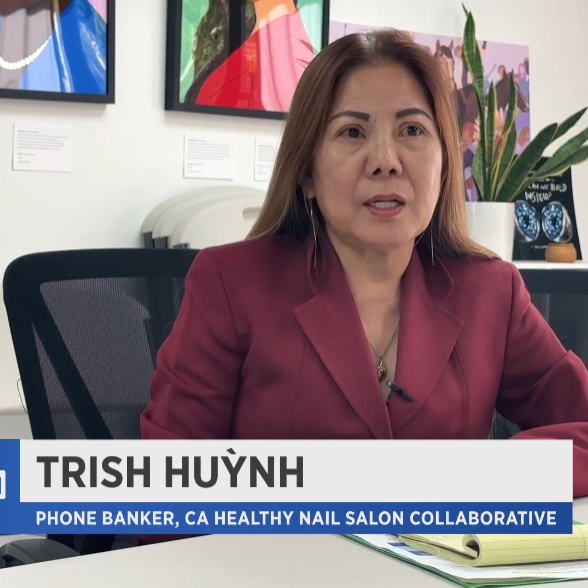As a public defender in Los Angeles in the early 2000s, I represented countless clients battling substance use challenges. The typical response was to lock them up, even for simple possession, offering little to no access to treatment.
Author: Yongho Kim
(This is a machine translation from the Vietnamese original article)
GARDEN GROVE, California – The California Healthy Nail Salon Collaborative (CHNSC) is organizing phone calls and voter education campaigns to create a voice for the Vietnamese community in the November 5 election.
For over a decade, the pendulum in California’s criminal justice policy has swung from a tough-on-crime approach prioritizing incarceration toward an approach emphasizing non-carceral strategies.
We are deeply disappointed in Governor Newsom’s decision to veto SB 299 (Limón), a crucial solution that would have established Secure Automatic Voter Registration (SAVR), enfranchised millions of eligible residents, and position California as a clear leader in expanding democracy while other states are overtly suppressing voters. The Governor has missed a tremendous opportunity to address the racist legacy of voter registration in his home state.
Over the last two years, 140 organizations across California joined the California Grassroots Democracy Coalition and have steadfastly advocated for SB 299. We hoped the Governor would heed the call of community organizers, working-class, Black, Latinx, Asian American, Pacific Islander, young people–ultimately, millions of Californians seeking a voice and a vote in our state’s democratic process.
By vetoing SB 299, Governor Newsom is maintaining an unnecessary barrier to the ballot for 4.7 million eligible but unregistered voters. This veto perpetuates California’s egregious and racially segregated voter participation gap. Under the current voter registration system, over half of Department of Motor Vehicles (DMV) users decline to register, partly due to users’ confusion, language barriers, or haste–rather than disinterest in voting. Voter registration was created to deter certain communities from participation, and it clearly continues to do so when California’s electorate is not representative of our state demographically.
Ultimately, the Governor chose not to invest in the Californians most impacted by systemic racism. By the intention and leadership of the author, delayed implementation of SB 299 to 2030 would not have impacted the 2024-2025 budget cycle and allowed for additional resources to be identified and secured for the measure’s success. SB 299 intended to use the existing pre-registration infrastructure established for 16 and 17-year-olds when receiving their driver’s licenses to pre-approve registration for millions of other Californians currently left out of our democracy, all while protecting non-citizens from being erroneously registered.
Our people-powered effort will continue fighting from every corner of the state to ensure that all communities and all eligible voters have access and opportunity to participate in our democracy.
SANTA ANA, Calif. — There are more than 10,000 calls left to go, but that wasn’t discouraging phone banker Trish Huỳnh. Instead, she sees it as an opportunity to get her Vietnamese community in Orange County excited about voting.
“I’ve seen the need of voter advocacy in our community,” said Huỳnh.
What You Need To Know
For years, Orange County was a safe region for the Republican Party — but recently, the county has become more of a toss-up
This year, Congressional District 45 and Congressional District 47 in OC are two of the more competitive districts in the state
Both are districts where the Asian American and Latino communities make up a big chunk of the voter-eligible populations
The county has the second largest concentration of Vietnamese people outside of Vietnam
That’s why, after beating cancer, Huỳnh decided to leave the nail salon industry where she had worked for 12 years and became an advocate for her community, volunteering as a phone banker with the California Healthy Nail Salon Collaborative, a grassroots organization advocating for the health of Vietnamese immigrant workers.
“I feel like, if you don’t vote, you are wasting an opportunity to use your voice. You are a citizen. You work so hard to become a citizen. So why aren’t you using your right to vote when you’ve worked so hard to gain it?” said Huỳnh.
Her message is one that Mindy Romero, director with the USC Center for Inclusive Democracy, says speaks to the changing political landscape in the area.
“From an engagement perspective, it’s a really exciting place that you have people now that are getting mobilized that didn’t get mobilized before, when it was seen as a safe district or safe county,” said Romero.
That’s because Orange County, the once stronghold for Republicans, has become a purple region. A turning of the tide that began in 2018 and has created two of the most competitive congressional districts in the state: 45 and 47.
The races have national eyes and a lot of funds being poured into them, as they can help decide what party takes congressional control come November. It’s another reason why the Asian American vote is being mobilized.
Both are districts in Orange County, where the Asian and Latino communities make up a big portion of the voter-eligible populations. The impact is most notable in the 45th Congressional District, where Asian Americans make up 37% of the voter eligible population, compared to 36% for the white population and 23% for Latino or Hispanic.
The county also has the second largest concentration of Vietnamese people outside of Vietnam.
Still, Romero says that despite the Asian and Latino communities already being a deciding voting bloc, the hurdle is getting them out to actually cast their ballot.
“The turnout rates for Asian Americans as well as Latinos are still much lower than they are for whites or just the general population in both districts,” said Romero.
That’s why Julie Vo, steering committee member with the California Healthy Nail Salon Collaborative, says their approach is breaking down barriers for engagement.
“When you’re answering a phone call from a phone banker during election cycle, if you hear someone on the other end who pronounces your name correctly, or if you’re a Vietnamese community member and [the person] is actually speaking in the language that is most accessible to you, all of those pieces are so critical,” said Vo.
Kiều Anh Đỗ, another former nail salon worker turned phone banker for the organization, says that beyond the language, it’s her community’s concerns that feel like a challenge.
“I just feel like a lot of my Vietnamese community are losing confidence in how voting can help them because they’re dealing with real-life issues right now of inflation, of rising costs that are impacting their daily lives,” said Đỗ.
Still, she believes voting is a way to make a change in those issues. And as a new citizen, it’s why she will be voting this November. She hopes their efforts will make an impact in this election and those to come.
An inmate at the Los Angeles County Sheriff’s Department Men’s Central Jail. (File photo by Hans Gutknecht, File Photo)
In recent weeks, proponents of Proposition 36 have drastically shifted their messaging. Initially, they claimed crime, including retail theft, was out of control and something they needed to urgently address. But with report after report debunking their claims, they have abandoned their original “tough on crime” message for a more sympathetic message of a “mass treatment” approach.
As a disability and human rights advocate, I am very concerned that the solutions proposed by Proposition 36 would only worsen the problems in communities. People with disabilities—especially people of color—are overrepresented in our prison system, with more than 40% of those in state prisons having a disability, compared to just 15% of the general population. As someone in recovery and a former drug dealer, I know firsthand how policies like those proposed by Proposition 36 could worsen the drug addiction crisis, which is a form of disability.
The reality is that Proposition 36 does nothing to address drug treatment in any kind of a “mass” way. In a last ditch effort to save their flailing proposition, proponents of proposition 36 are misleading the public and ignoring basic facts about the urgent gaps we have in our drug treatment system.
Supporters of Proposition 36, including politicians like San Jose Mayor Mahan, argue that drug addiction is the root cause of retail theft, overdose deaths, and homelessness in California. And now they are trying to convince the public that Proposition 36 offers tools needed to help people get into treatment for retail theft and homelessness that were taken away by Proposition 47. The backers of Proposition 36 euphemistically refer to this program as a “treatment mandated felony.”
But Proposition 36 does not provide any new funding for drug treatment. The Legislative Analyst’s Office’s official analysis found that Proposition 36 would actually cut funding for mental health and drug treatment programs by millions. Even the proponents of this measure have conceded Proposition 36 lacks proper funding and have attempted to tie it to unrelated funding sources, a strategy that simply doesn’t make sense.
Their messaging becomes all the more frustrating and unacceptable as the state of drug treatment in California only gets worse. Access to quality drug rehabilitation has become increasingly difficult, with residential treatment durations reduced from 3-9 months to just 1-3 months. There are limited housing options following rehabilitation, such as housing accommodations for mothers and their children, forcing difficult decisions upon completion of treatment. Governor Newsom vetoed legislation to legalize safe injection sites, one of the only real solutions to preventing overdose deaths. Proposition 36 does nothing to address these important issues in the fight against drug addiction.
Proponents of Proposition 36 are proposing the same old approaches that have already failed. They argue that by adding drug mandated treatment back into the fold, people will get treatment. But that is not a novel idea or intervention. Drug mandated treatment exists today. As much as we wish otherwise, mandating drug treatment for individuals convicted of a drug-related offense is not effective in reducing drug use. Continuing with this approach will only make things worse.
Despite the shift in narrative, Proposition 36 is still a tough on crime measure. Proposition 36 will do nothing to address the geopolitical fentanyl supply crisis and instead goes after users who are selling drugs to support their addiction. Decades of research has shown going after low level dealers and users does nothing but put people at risk of overdose. Disrupting supply lines in a community with no sufficient services leaves people who use drugs with no other option than to turn to riskier suppliers, worsening the overdose crisis.
Reversing Proposition 47, as Proposition 36 proposes, will likely actually worsen houselessness, an outcome that is, while hard to imagine, very possible. Proposition 36 will put more people in prison, only increasing their likelihood of becoming unhoused upon release because a criminal record prevents people from accessing housing, income, and the stability needed to survive in an increasingly unlivable state. Not only will it exacerbate houselessness, but evidence shows drug use is not the root cause of homelessness. The number one reason Californians end up homeless is a loss of income, not drug use.
Related Articles
- Commentary |Enough is enough: Orange County’s taxpayers deserve accountability and transparency
- Commentary |Senate Bill 900 is a bonanza for insurance companies and a blow to housing affordability
- Commentary |Gov. Newsom’s emergency hemp rules could block life-saving therapies
- Commentary |Vote No on Proposition 2: Let’s not go deeper in debt for a broken system
- Commentary |Gov. Newsom must reject AB 2527 and end solitary confinement for pregnant women
Real treatment does not exist at the end of the legal process under Proposition 36. Death is a likely outcome for those who do not survive prison. Putting people with drug addiction in prison will only force them into torturous withdrawals and overdoses. After going through excruciating pain, people will be released back to the streets, which is the most dangerous time for overdose risk. Proposition 36 will lead to higher levels of drug addiction and overdoses.
To truly address this crisis, I believe we need improved and expanded housing, safe injection sites, increased detox capacity, and longer stays in treatment facilities as needed. We need restorative justice initiatives that focus on family reunification in rehabilitation programs, investment in reentry processes, and paid entrepreneurial programs. This is what “mass treatment” looks like, not the empty messages of Prop 36, which will not actualize these interventions but rather put people into the costly cycle of imprisonment and poverty.
Vanessa Ramos is an advisor at Disability Rights California
California Gov. Gavin Newsom calls the Proposition 36 initiative a “drug policy reform that takes us back decades.” | Rich Pedroncelli/AP
09/16/2024 05:01 AM EDT
Gov. Gavin Newsom is trying to defeat a tough-on-crime ballot initiative by convincing voters it would mark a return to the drug war launched by Richard Nixon.
Newsom, one of the few prominent Democrats speaking out against the Proposition 36 initiative, calls it a “drug policy reform that takes us back decades.” Civil rights groups refer to the measure as the “War on Drugs 2.0.”
Ten years ago, California voters soured on the state’s decades’-long experiment with mass incarceration. After years in which badly thought out, financially devastating and morally corrosive laws such as Three Strikes and You’re Out made California less safe, in 2014 a majority of the electorate opted for a new approach.
In passing Proposition 47, Californians made a bet on a more effective approach to criminal justice. Instead of sending people to prison for minor crimes, more people would be sentenced to jail, and the resulting savings would be invested in proven crime prevention strategies like drug and mental health treatment programs, job training, services and support for crime victims and supportive housing.
In 1997, Tommy Eugene Lewis III was sentenced to 41 years to life in state prison for attempted murder after he shot and injured another driver. He was 18 years old.
Three years ago, at 43, Lewis was released from prison. He’d spent his entire adult life behind bars and wasn’t sure what was next.
Oil industry drops ballot challenge (SacBee)
California oil industry drops ballot challenge to law that bans drilling near homes, schools BY ARI PLACHTA UPDATED JUNE 27, 2024 9:25 AM
A California oil industry group said Wednesday it would withdraw an initiative from the November ballot challenging a state law that bans drilling within 3,200 feet from homes, schools and businesses. Instead, the California Independent Petroleum Association said it would challenge the law in court.









